Though as one of the most important public museums in China, Shaanxi History Museum is not as large as the Beijing Palace Museum, Shanghai Museum, Nanjing Museum and other big museums. Currently only 6000 visitors are allowed to enter the museum each day, and reservation should be made on its official website or official Wechat account in advance. The counters don’t sell tickets. To reserve the tickets of Shaanxi History Museum, you (including Chinese) need to have a Wechat account to login in its official website (https://ticket.sxhm.com/) or Wechat Account (陕西历史博物馆). If you want to reserve tickets of charging displays, your Wechat has to have deposit of some amount of Chinese currency to make payment for your booking. Under such circumstances, you are suggested to find a travel agency, like China Discovery, to reserve the ticket of Shaanxi History Museum for you, or let your Chinese friends who have Wechat reserve the ticket for you. Your passport information is required. You can reserve the tickets of the charging displays, such as the Exhibition Hall for Treasures of Great Tang (CNY 20), so that you don’t have to wait for long time in lines as regular tickets holders. Just don’t go to the museum without reservation. If you need an alternative museum to go, Xian Museum is a good choice. Below are 2 recommended Xian Tour Packages including Shaanxi History Museum:
- 2 Days Xian City Break
- 4 Days Xian Highlights Tour with Mount Huashan Hiking
Shaanxi is one the important places where Chinese civilization pullulated to blossom. Thirteen imperial dynasties including most prosperous Qin, Han, and Tang Dynasties have set capital here. As a result, abundant cultural remains and profound historical accumulation formed Shaanxi’s featured history and culture.
With a total area of 65,000 square meters and 8,000 square meters of cultural relics’ zone, Shaanxi History Museum is a first large-scale modern national museum in China. People called Shaanxi History Museum “Bright Pearl in Ancient Capital and Precious Treasure of China”, for it is an art palace fully showing Shaanxi history & culture as well as Chinese ancient civilization. In 2008, it was awarded as National First Level Museum. With large quantity, complete types, high grade and high value, the collections in Shaanxi History Museum range from the stone-made tools in ancient times to different implements in 1840 years ago - over 1 million years period.
The main buildings of Shaanxi History Museum include the Preface Hall, basic exhibition halls, special exhibition halls, and temporal exhibition Halls. The basic halls are divided into three exhibition halls with 2,000 cultural relics to display the history of ancient times in chronological order. The first exhibition Hall is located in the ground floor while other two is in the second floor. Else representative exhibition halls include Treasures of Great Tang in the west underground floor and Mural Paintings of Tang in the east underground floor.
While designing the buildings in Shaanxi History Museum, the great designer used traditional palace construction of Tang Dynasty for reference. Adopting symmetry axis layout with obvious principal and subordinate buildings in order and four worship halls around, the complex architectures show the charming presence of prosperous Tang Dynasty. The predominant colors of the buildings are white, grey and black which create an atmosphere of solemnity.
We can explore the history from Prehistoric Times to Qin Dynasty in sequence by these valuable collections.
First unit in this hall is From Apes to Human Beings. The remains of ancestors lived in 1,150,000 years ago are perfect representation of the vibrant childhood and the dawn of Chinese Civilization.
The second unit, Blossom of Zhou Dynasty, shows the political institution and economic pattern of ancient Chinese state by rich relics of the emperors of Zhou Dynasty. Bronze wares are most typical.
In 221 BC, Qin State united the different parts of China and built the first unified multi-ethnic centralized feudal empire. East Empires is the third unit which focuses on terracotta warriors statues of Qin Dynasty and shows the tremendous momentum.
There are two parts in the Second Exhibition Hall, Vigorous Han Dynasty and Conflict and Fusion.
The first upsurge of social development of China, like booming economy and culture and open-door to the outside world, are embodied in Vigorous Han Dynasty. Here you can feast your eyes on assortments of treasures among which some are national treasure including: Jade Seal with Characters “Huang Hou Zhi Xi (皇后之玺)” which is the only surviving example of material evidence for the study of Empress’s seal of Han Dynasty, Bronze Bamboo-joint-shaped Censer with Gilded Gold and Silver, Gold Discs, Gilded Bronze Water Container and so on.
Conflict and Fusion collects many cultural remains and religion relics of agricultural nation and grassland nationality. Great collections like the golden seal with Characters “Jin Gui Yi Qiang Wang (晋归义羌王)”, Dugu Xin (独孤信) ’s 26-faced Jet Seal, Golden Monster of Han Dynasty etc. All these objects reflect the harmony of multi-nations and the flourishment of Buddhism and Han’s art.
Thriving Tang and Farewell to Imperial Capital constitute the Third Exhibition Hall.
Through the exhibition of Thriving Tang, Tang Dynasty at the height of power and splendor comes to your eyes. Once being the capital of Tang Dynasty, Xi’an is the place where most relics from Tang Dynasty were excavated. Each one of Tri-colored Crouching Camel, Gold Bowl with Design of Lotus Petals and Mandarin Ducks, Gilded Bronze Dragon with Iron Core, Mirror with Lacquered Back Inlaid with Four Phoenixes Holding Ribbons in their Mouths and Secret Celadon Dish is cherished treasure.
From Farewell to Imperial Capital, we can learn that Shaanxi Province remained its charm despite it was no longer capital any more.
Murals from Tang Dynasty Tomb (Admission: 270 RMB) are most featured collections in Shaanxi History Museum. Covering over 1,000 square meters, there are about 600 murals themed with Tang-style architecture, concise but vivid human figures, distinguished featured wares and sprightly natural landscape. They make a great contribution to studying the social life especially the material life and spiritual pursuit of the nobilities.
Tang Dynasty is the most powerful dynasty in China’s history and gold ware, silver wares and jade articles are the symbol of Tang Dynasty. In 1970, more than 1,000 relics were discovered in Hejia Village in Shaanxi and they are exhibited in Shaanxi History Museum. These exhibits attract a mass of history-enthusiasts with its high quality, ample variety and good protection.
Beast Head Agate Cup is the most valuable treasure of Shaanxi History Museum. With a caliber of 5.9 cm, it is in the pocket-size, just 6.5 cm in height and 15.6 m in length. Inlaid with golden mouth and carved with distinctive layers in the three-colored agate, this Beast Head Agate Cup shows indeed skilled craftsmanship. According to historical materials, this sandwich agate is similar to “Rhyton”, so it becomes a great reference to study the cultural communication between western country and ancient China, especially in Tang Dynasty.
Popular Xian Tour Packages:
>> 2 Days Xi'an City Break
>> 3 Days Classic Xi'an Tour
>> 10 Days Classic Silk Road Tour
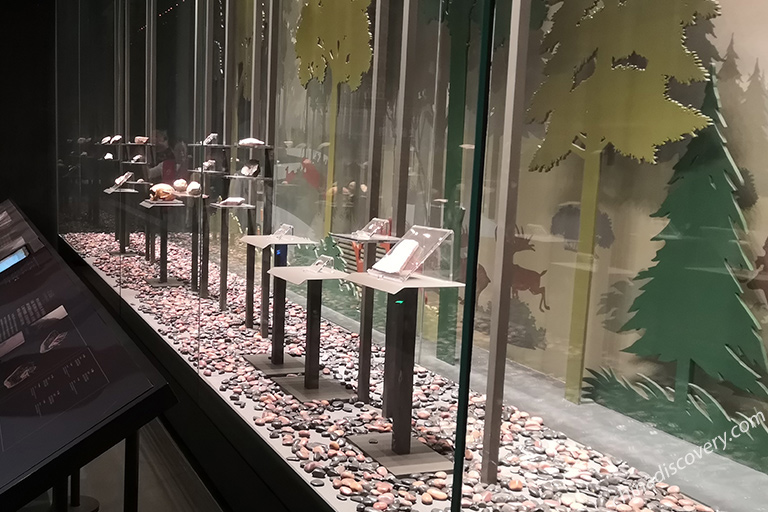 First Exhibition Hall
First Exhibition Hall
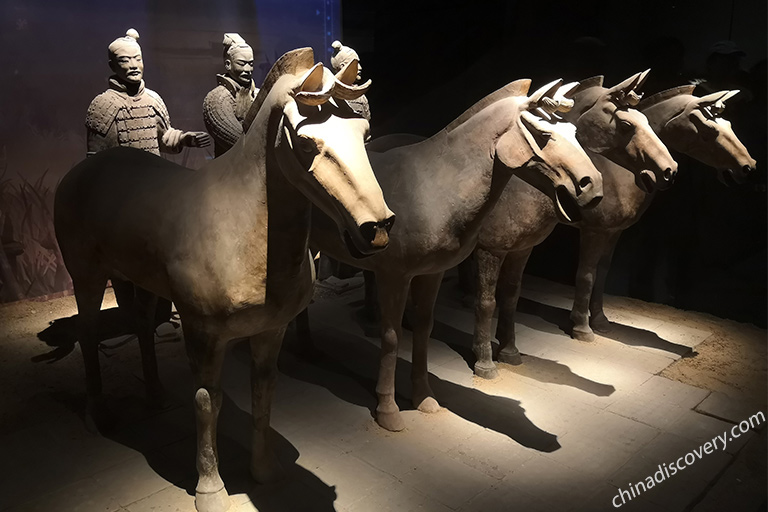 Terracotta Warriors in Shaanxi History Museum
Terracotta Warriors in Shaanxi History Museum
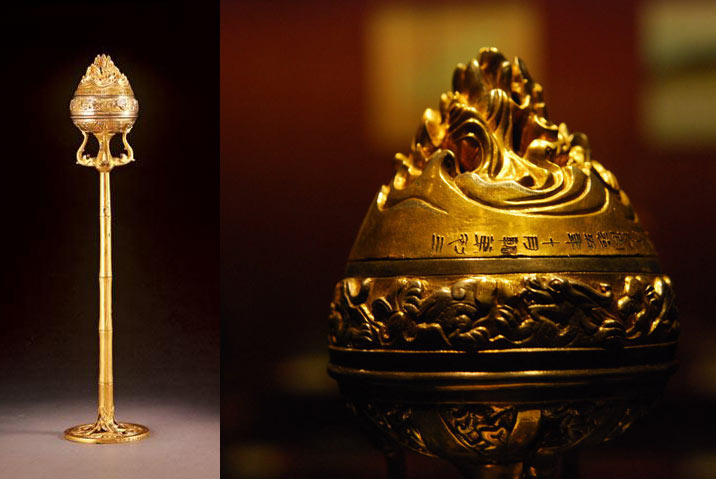 Bronze Bamboo-joint-shaped Censer
Bronze Bamboo-joint-shaped Censer
 Jade Seal - An precious Empress's Seal
Jade Seal - An precious Empress's Seal
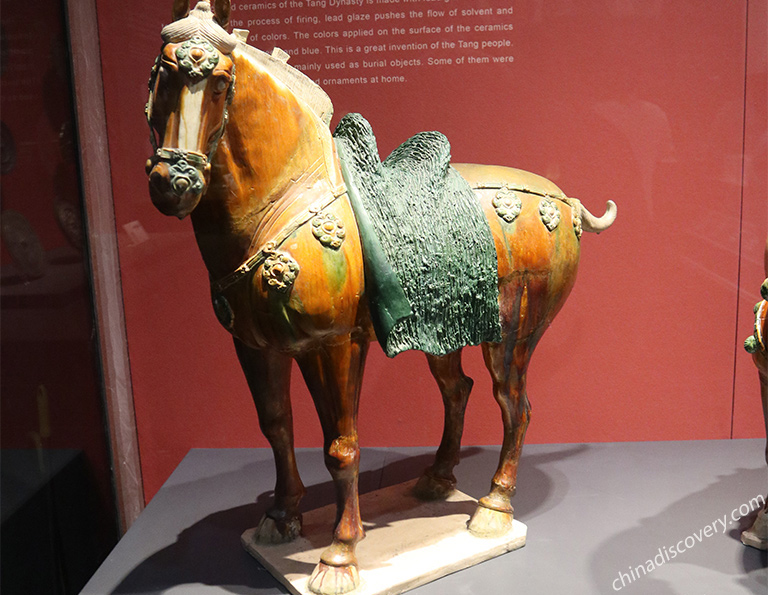 Tri-colored Crouch Camel
Tri-colored Crouch Camel
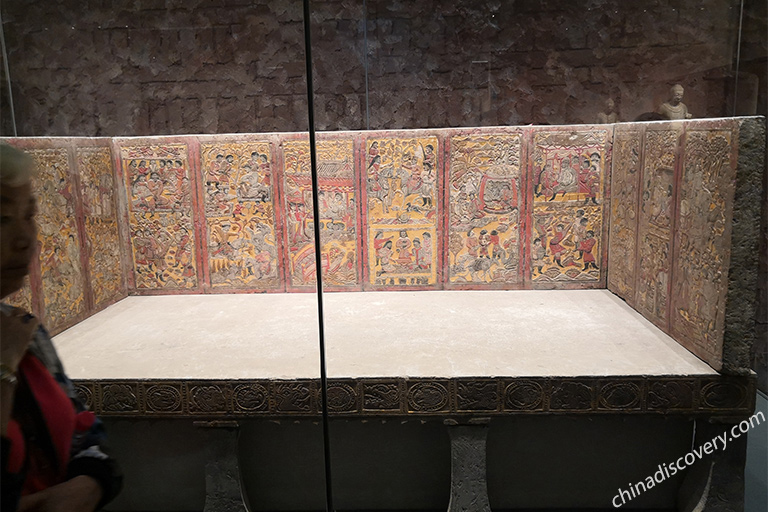 Murals of Tang Dynasty Tombs
Murals of Tang Dynasty Tombs
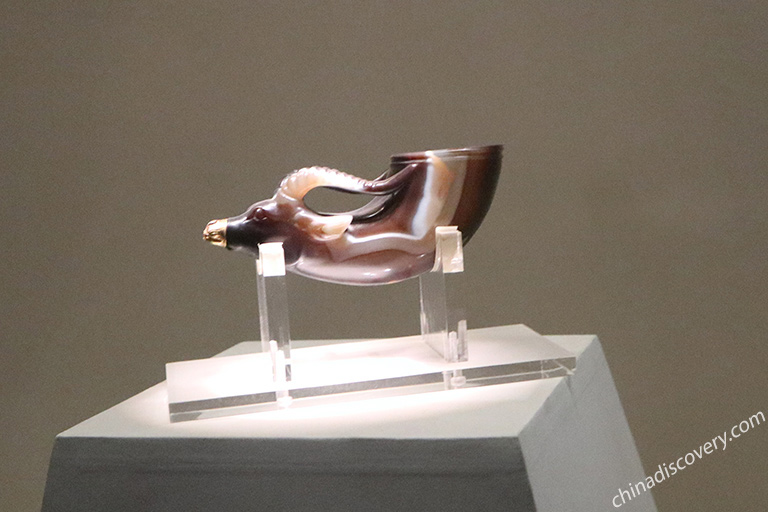 Beast Head Agate Cup
Beast Head Agate Cup
Located in Xi'an City, Shaanxi History Museum is quite easy to get to.
If you want to get rid of hustle of public transportation and troublesome navigation, you can book a private tour package which covers sightseeing, dining and transfer from us. Our local tour guide and driver will escort you to Shaanxi History Museum with speed and convenience, and take care of all the details. You just need to focus on sightseeing.
Giant Wild Goose Pagoda, only one kilometer from Shaanxi History Museum, is the existing largest and oldest pagoda in China. It is regarded as the gem of Chinese ancient architectural history and a sacred Buddhist land for its rich Buddhist culture, profound history of famous figures, splendid architectural art. It is also the symbolic building which served as the cohesion of the intelligence of working people in ancient China. Climbing up to the top of Giant Wild Goose Pagoda and watching out, you will get a magnificent view.
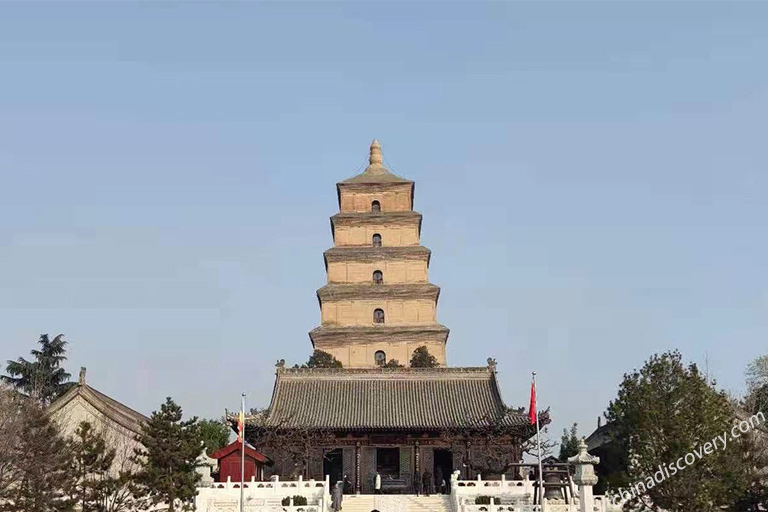 Giant Wild Goose Pagoda
Giant Wild Goose Pagoda
Xian has a lot of places to visit. Terracotta Warriors and Horses is definitely the No.1 must-see. After that, take a stroll or rent a bike on the Ancient City Wall, the largest and best-preserved ancient city wall in China, to enjoy panoramic views of modern Xi’an. Then try some local snacks at the bustling and lively Muslim Quarter. On the next day, you can go to visit Da Cien Temple and Giant Wild Goose Pagoda to feel the Buddhist culture, then get a deeper understanding of the past of this city in Shaanxi History Museum. If you are interested in mountain climbing, don’t miss the challenging Mount Huashan which is famous for lofty peaks and steep paths. If you have other ideas or questions about a Xian tour, please feel free to contact us. We are also specialized in customized tours according to your own requirements, interests, travelling budgets, etc.
- 2 Days Xian City Break
- 3 Days Classic Xian Tour
- 4 Days Xian Highlights Tour with Mount Huashan Hiking
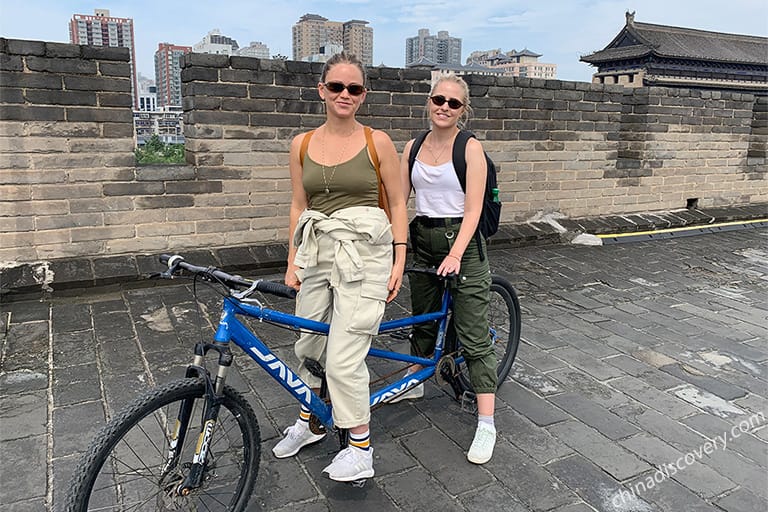 Biking on Xian Ancient City Wall
Biking on Xian Ancient City Wall
Top 3 Xian tours chosen by most customers to explore Xian in the best way. Check the detailed itinerary, or tailor your own trip now with us.
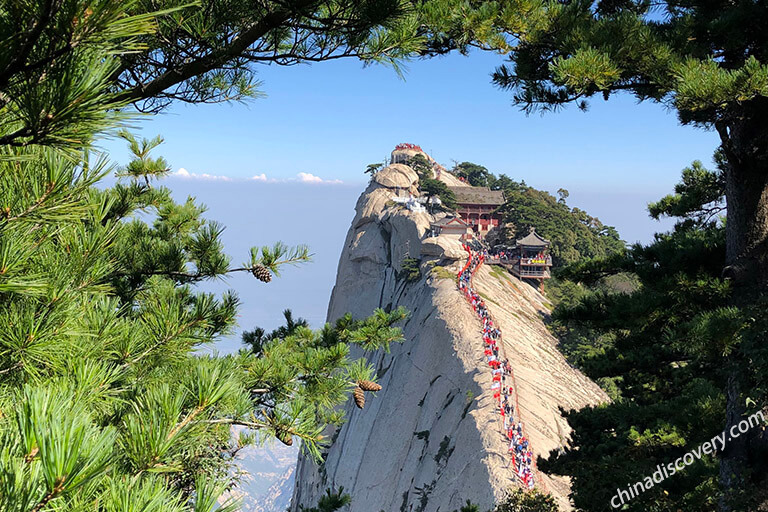
Xian / Mount Huashan
Start planning your tailor-made holiday to China by contacting one of our specialists. Once inquired, you’ll get a response within 0.5~23.5 hours.
Customize a Trip